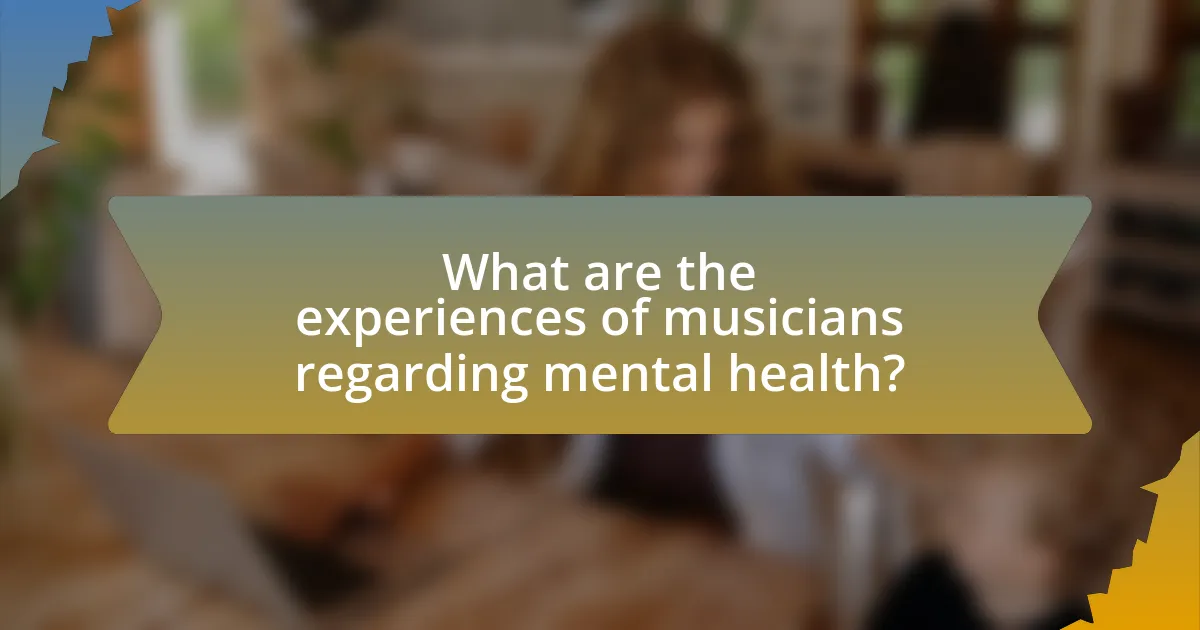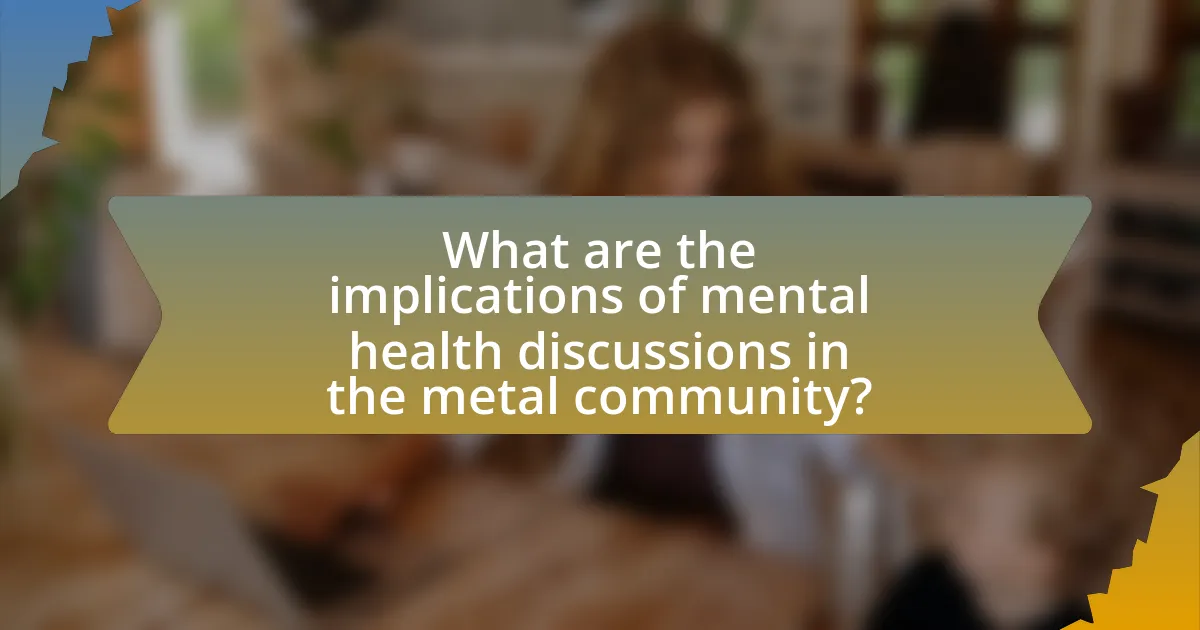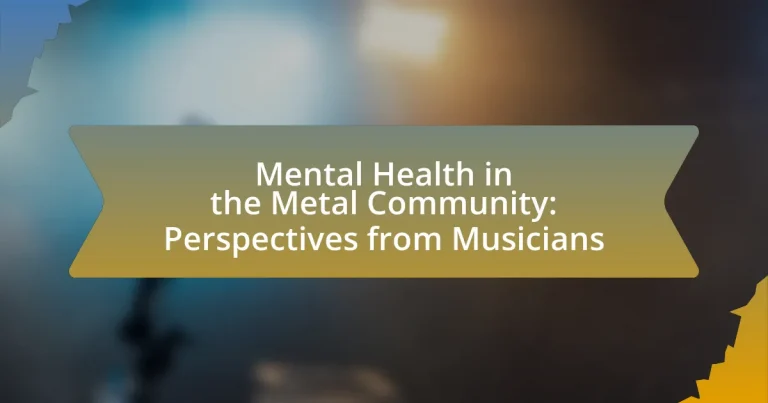Mental health in the metal community encompasses the psychological well-being of individuals involved in the metal music genre, highlighting prevalent issues such as anxiety, depression, and substance abuse. Research indicates that musicians in this genre face higher rates of mental health challenges compared to the general population, with significant numbers reporting anxiety and depression. The article explores how mental health is perceived within the community, common challenges faced by musicians, the influence of metal culture on mental health perceptions, and the importance of open discussions to reduce stigma. Additionally, it examines coping strategies employed by musicians, the role of community support, and available resources aimed at promoting mental well-being among metal artists.

What is Mental Health in the Metal Community?
Mental health in the metal community refers to the psychological well-being of individuals involved in or connected to the metal music genre. This community often grapples with issues such as depression, anxiety, and substance abuse, which can be exacerbated by the intense emotional expression found in metal music. Research indicates that musicians, including those in the metal genre, face higher rates of mental health challenges compared to the general population, with studies showing that 73% of musicians experience anxiety and 68% face depression. The metal community has increasingly recognized the importance of mental health awareness, leading to initiatives aimed at providing support and resources for those struggling.
How is mental health perceived within the metal community?
Mental health is perceived within the metal community as a significant and often openly discussed issue. Many musicians and fans acknowledge the struggles associated with mental health, with numerous artists using their platforms to address topics like depression, anxiety, and addiction in their lyrics and public statements. For instance, studies have shown that a substantial number of metal musicians report mental health challenges, with a survey by the UK-based charity Help Musicians revealing that 71% of musicians experience anxiety or depression. This openness fosters a supportive environment where individuals feel encouraged to seek help and share their experiences, contributing to a culture that prioritizes mental well-being.
What are common mental health challenges faced by musicians in this genre?
Musicians in the metal genre commonly face mental health challenges such as anxiety, depression, and substance abuse. These issues often stem from the intense pressure to perform, the demands of touring, and the stigma surrounding mental health in the music industry. Research indicates that musicians are at a higher risk for mental health disorders compared to the general population, with studies showing that 73% of musicians experience anxiety and 68% report depression. The unique lifestyle associated with metal music, including late-night performances and a culture that sometimes glorifies substance use, exacerbates these challenges.
How does the culture of metal music influence mental health perceptions?
The culture of metal music significantly influences mental health perceptions by fostering a sense of community and providing an outlet for emotional expression. This genre often addresses themes of struggle, pain, and resilience, which can resonate with listeners experiencing mental health challenges. Research indicates that fans of metal music frequently report feeling understood and less isolated due to the genre’s candid exploration of dark emotions and societal issues. A study published in the journal “Psychology of Music” by authors like Dr. Adrian North and Dr. David Hargreaves found that metal music can serve as a coping mechanism, allowing individuals to process their feelings and connect with others who share similar experiences. This communal aspect can lead to a more open dialogue about mental health within the metal community, ultimately reducing stigma and promoting awareness.
Why is it important to discuss mental health among metal musicians?
Discussing mental health among metal musicians is crucial because this genre often addresses themes of struggle, pain, and emotional turmoil, which can resonate deeply with both artists and fans. The metal community has a higher prevalence of mental health issues, with studies indicating that musicians are more likely to experience anxiety, depression, and substance abuse compared to the general population. By openly discussing these challenges, metal musicians can foster a supportive environment, reduce stigma, and encourage others to seek help, ultimately promoting better mental health within the community.
What impact does mental health have on musical creativity and performance?
Mental health significantly influences musical creativity and performance by affecting emotional expression and cognitive processes. Musicians experiencing mental health challenges, such as anxiety or depression, may find it difficult to engage in the creative process, leading to reduced output and performance quality. Research indicates that mental health issues can hinder motivation and focus, which are essential for both songwriting and live performances. For instance, a study published in the Journal of Affective Disorders found that musicians with depressive symptoms reported lower levels of creativity and performance satisfaction. This correlation highlights the critical role mental well-being plays in the artistic endeavors of musicians, particularly within the metal community, where emotional intensity is often a key component of the music.
How can discussing mental health reduce stigma in the metal community?
Discussing mental health can significantly reduce stigma in the metal community by fostering open dialogue and increasing awareness. When musicians and fans share their experiences with mental health challenges, it normalizes these discussions and encourages others to seek help without fear of judgment. Research indicates that communities that engage in conversations about mental health see a decrease in stigma; for instance, a study published in the “Journal of Affective Disorders” found that increased public discourse on mental health issues correlates with reduced negative perceptions and discrimination. By creating a supportive environment, the metal community can dismantle harmful stereotypes and promote mental well-being among its members.

What are the experiences of musicians regarding mental health?
Musicians often experience significant mental health challenges, including anxiety, depression, and substance abuse. Research indicates that the pressures of performance, financial instability, and the demands of the music industry contribute to these issues. A study published in the Journal of Affective Disorders found that musicians are three times more likely to experience depression compared to the general population. Additionally, the unique lifestyle of musicians, characterized by irregular hours and social isolation, exacerbates mental health struggles. These experiences highlight the need for increased awareness and support systems within the music community to address mental health effectively.
How do musicians in the metal genre cope with mental health issues?
Musicians in the metal genre cope with mental health issues through various strategies, including open discussions about their struggles, engaging in therapy, and utilizing music as a form of expression and catharsis. Many metal musicians openly share their experiences with mental health challenges, fostering a sense of community and support among fans and peers. For instance, studies indicate that musicians often find solace in songwriting, which allows them to process emotions and experiences, thereby reducing feelings of isolation. Additionally, some musicians participate in mental health advocacy, raising awareness and encouraging others to seek help, which can further enhance their own coping mechanisms.
What coping strategies do metal musicians commonly employ?
Metal musicians commonly employ coping strategies such as songwriting, performance, and community engagement to manage mental health challenges. Songwriting serves as a therapeutic outlet, allowing musicians to express emotions and experiences, which can alleviate stress and anxiety. Performance provides a sense of purpose and connection with audiences, fostering a supportive environment that can enhance mental well-being. Additionally, community engagement through collaboration and support networks offers a sense of belonging, which is crucial for coping with the pressures of the music industry. These strategies are validated by various studies highlighting the importance of creative expression and social support in mental health management among artists.
How do personal experiences shape their views on mental health?
Personal experiences significantly shape musicians’ views on mental health by influencing their understanding and empathy towards mental health issues. Many musicians in the metal community have faced personal struggles, such as depression, anxiety, or substance abuse, which leads them to advocate for mental health awareness and support. For instance, studies show that musicians are at a higher risk for mental health challenges, with a 2016 survey indicating that 71% of musicians experience anxiety and 68% face depression. These lived experiences foster a deeper connection to mental health topics, prompting musicians to share their stories and encourage open discussions within their communities.
What role does community support play in mental health for metal musicians?
Community support plays a crucial role in the mental health of metal musicians by providing a sense of belonging and understanding. This genre often addresses themes of struggle and resilience, fostering a supportive environment where musicians can share their experiences and challenges. Research indicates that social support can significantly reduce feelings of isolation and depression, which are prevalent in the music industry. For instance, a study published in the Journal of Music Therapy found that musicians who engage with their community report higher levels of emotional well-being and lower levels of anxiety. This highlights the importance of community networks in promoting mental health among metal musicians.
How do fans and fellow musicians contribute to mental health awareness?
Fans and fellow musicians contribute to mental health awareness by openly discussing their own struggles and supporting each other through shared experiences. For instance, many musicians use their platforms to share personal stories about mental health challenges, which helps to destigmatize these issues and encourages fans to seek help. Research indicates that 1 in 5 adults experience mental illness, and when artists like Chester Bennington and Chris Cornell spoke about their battles, it resonated with fans, prompting conversations about mental health in the community. Additionally, fans often create supportive environments at concerts and online, fostering a sense of belonging that can alleviate feelings of isolation. This collective effort not only raises awareness but also promotes understanding and empathy within the metal community.
What initiatives exist within the metal community to support mental health?
Initiatives within the metal community to support mental health include organizations like the Metal Health Foundation and the nonprofit organization, Help Musicians UK. The Metal Health Foundation focuses on raising awareness about mental health issues specifically within the metal genre, providing resources and support for musicians and fans alike. Help Musicians UK offers mental health services, including counseling and workshops tailored for musicians, recognizing the unique pressures they face. These initiatives are backed by statistics indicating that musicians are at a higher risk for mental health issues, with studies showing that 71% of musicians experience anxiety and depression.

What are the implications of mental health discussions in the metal community?
Mental health discussions in the metal community lead to increased awareness, reduced stigma, and enhanced support networks for individuals facing mental health challenges. By openly addressing issues such as depression, anxiety, and substance abuse, musicians and fans alike foster a culture of understanding and acceptance. For instance, studies indicate that musicians in the metal genre often share personal experiences related to mental health, which can resonate with fans and encourage them to seek help. This dialogue not only promotes healing but also strengthens community bonds, as evidenced by initiatives like mental health awareness campaigns at metal festivals and concerts.
How can mental health awareness lead to positive changes in the metal scene?
Mental health awareness can lead to positive changes in the metal scene by fostering a supportive environment that encourages open discussions about mental health issues among musicians and fans. This increased dialogue can reduce stigma, allowing individuals to seek help without fear of judgment. For instance, initiatives like the “Heavy Music Awards” have highlighted mental health, promoting resources and support networks within the community. Additionally, studies show that musicians often face higher rates of mental health challenges; therefore, awareness campaigns can provide essential tools and resources, ultimately improving the well-being of artists and their audiences.
What are the potential benefits of increased mental health advocacy?
Increased mental health advocacy can lead to improved awareness and understanding of mental health issues within communities, particularly in the metal music scene. This heightened awareness can reduce stigma, encouraging individuals to seek help and support without fear of judgment. Research indicates that communities with strong mental health advocacy experience lower rates of mental health crises and improved overall well-being. For instance, a study published in the Journal of Mental Health found that advocacy efforts significantly increased the likelihood of individuals accessing mental health services, demonstrating the tangible benefits of such initiatives.
How can the metal community create a more supportive environment for musicians?
The metal community can create a more supportive environment for musicians by fostering open dialogue about mental health and providing resources for emotional well-being. Initiatives such as mental health awareness campaigns, workshops, and support groups can help musicians feel less isolated and more understood. Research indicates that musicians often face high levels of anxiety and depression, with a study published in the Journal of Affective Disorders showing that 71% of musicians experience mental health issues. By prioritizing mental health discussions and creating safe spaces for sharing experiences, the metal community can significantly enhance the support network for its musicians.
What practical steps can musicians take to prioritize their mental health?
Musicians can prioritize their mental health by establishing a structured routine that includes regular breaks, physical exercise, and mindfulness practices. A structured routine helps create a sense of stability, which is crucial for mental well-being. Regular breaks prevent burnout, while physical exercise has been shown to reduce anxiety and depression symptoms. Mindfulness practices, such as meditation or deep-breathing exercises, can enhance emotional regulation and reduce stress levels. Research indicates that musicians are at a higher risk for mental health issues, with a study published in the Journal of Affective Disorders revealing that 71% of musicians experience anxiety and depression. By implementing these practical steps, musicians can create a healthier balance in their lives and improve their overall mental health.
What resources are available for metal musicians struggling with mental health?
Metal musicians struggling with mental health can access several resources tailored to their needs. Organizations like MusiCares provide support through mental health services, including counseling and financial assistance for treatment. Additionally, the Heavy Metal Therapy initiative offers therapeutic programs specifically designed for musicians, focusing on mental well-being through music. Peer support networks, such as the Metal Health Coalition, connect musicians with others who share similar experiences, fostering a sense of community and understanding. These resources are vital, as studies indicate that musicians face higher rates of mental health issues compared to the general population, highlighting the importance of targeted support systems.
How can musicians build a personal support network for mental well-being?
Musicians can build a personal support network for mental well-being by actively engaging with peers, mentors, and mental health professionals. Establishing connections through music communities, social media platforms, and local events allows musicians to share experiences and seek advice. Research indicates that social support significantly reduces feelings of isolation and enhances emotional resilience, which is crucial in the high-pressure environment of the music industry. For instance, a study published in the Journal of Music Therapy found that musicians who participated in group therapy reported improved mental health outcomes, highlighting the effectiveness of collaborative support systems.


